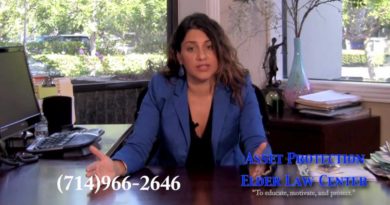4 Things Trusts Do That Wills Can’t Do
Far too many people assume that estate planning boils down to the creation of a will. In fact, there are limitations when you use a will. On the other hand, there are trusts that can accomplish things that cannot be done with a will. In this post, we will look at four of them.
Nursing Home Asset Protection
When you reach the age of 67, your life expectancy is 87 years if you are a woman, and 85 years if you are a man. Most people expect to live long enough to collect Social Security. If you do, this is your life expectancy. Unfortunately, it can be difficult to take care of your own activities of daily living when you are in your mid-80s.
According to the United States Department of Health and Human Services, just over one third of seniors will require nursing home care eventually. These facilities are very expensive, and Medicare doesn’t cover the custodial care that they provide.
Medicaid does pay for long-term care, but there is a $2,000 limit on countable assets. If you maintain possession of your assets and use a will is your estate planning vehicle, you may never qualify for Medicaid. However, everything changes if you use an irrevocable trust.
You can transfer assets into the trust, and you would no longer be able to touch the principal. However, you can continue to receive earnings that are generated by the assets in the trust. Five years after you fund the trust, the assets would not count if you apply for Medicaid to pay for nursing home care.
Spendthrift Protections
If you leave an inheritance to someone that is not good with money to the terms of a will, there are no safeguards going forward. This is not the case if you use a revocable living trust with a Spendthrift provision as the centerpiece of your estate plan.
While you are living, you would be the trustee, she would control the assets on every level. When you create the trust, you name a successor trustee to administer it after your death.
When you expire, the trust will become irrevocable. The spendthrift beneficiary would not be able to access the principal directly. This would also apply to their creditors, so there is asset protection.
In the trust declaration, you can instruct the trustee to distribute certain about each month to prevent reckless spending. The terms could include larger distributions when the beneficiary reaches certain age plateaus. This is one way the inheritance could be structured, but you have the power to make those decisions.
Special Needs Planning
Many people with disabilities rely on Medicaid for health insurance. They also receive Supplemental Security Income. These programs are need-based. If a benefit recipient comes into money through an inheritance, they would be in a different financial position. Depending on the amount, this could cause a forfeiture of benefit eligibility.
Fortunately, a supplemental needs trust can be used to preserve the benefits. The trustee would be able to make the beneficiary more comfortable in many ways if you establish this type of trust. As long as everything is done according to the rules, there would be no disruption of Medicaid and SSI eligibility.
Estate Tax Efficiency
High net worth individuals have to be concerned about the federal estate tax. It can be levied on the portion of an estate that exceeds $12.06 million in value. There are trusts that can be used to facilitate tax efficient asset transfers.
Schedule a Consultation Today!
These are a handful of the things that a trust can do, and there are a number of others. There are many tools in the estate planning toolkit, and we can help you understand your options so you can make the right choices.
If you are ready to get started, you can schedule a consultation at our Oklahoma City estate planning office if you call us at 405-843-6100, or you can use our contact form to send us a message.
After helping his own family deal with a lengthy probate and the IRS following his father’s untimely death in a farm accident, Larry Parman made a decision to help families create effective estate plans designed to reduce taxes, minimize legal interference with the transfer of assets to one’s heirs, and protect his clients’ assets from predators and creditors.
Latest posts by Larry Parman, Attorney at Law (see all)
Story originally seen here






